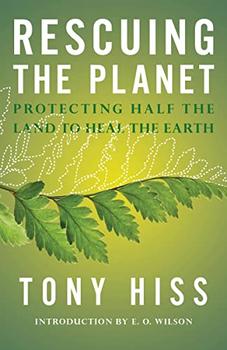Summary | Excerpt | Reviews | Beyond the Book | Readalikes | Genres & Themes | Author Bio

Protecting Half the Land to Heal the Earth
by Tony Hiss
The idea here is that these Indigenous Protected Areas, or IPAs, can be set up more quickly than conventional national parks, and they'll be staffed by Indigenous Guardians, paid for by the government, rangers-from-within who already have intimate knowledge of land they've grown up caring for, people who can see the forests and the trees and how they work together. Yellowstone was created by taking land away from Native Americans, so this is something else that sets IPAs apart. These parks will never be set up by stripping landscapes from the people who were there first and have looked after them since.
The other Steve K was Stephen Kakfwi, a national figure in Canada. He is a Dene (an Indigenous word meaning "the people") from a village just south of the Arctic Circle and a former premier of the Northwest Territories, which is a little like being governor of a U.S. state. He spent sixteen years as a provincial cabinet member, and he's a former president of the Dene Nation, an organization that's been protecting the rights of the Dene people for fifty years. He's also a folksinger and songwriter; a few days earlier he'd performed live on a Canadian Broadcasting Corporation radio show, accompanying his North Country ballads on a harmonica and guitar. Kakfwi wears his long graying hair in a ponytail, and Kallick resembles a ginger Santa going gray.
The two Steve Ks had come together to talk about what they referred to as the "big chance" for safeguarding the Boreal—an unprecedented opportunity to accelerate the launching of IPAs immediately and over the next ten years throughout the last forest left with more undisturbed areas than any of the other great world forests. Siberia, the Amazon, the Boreal—the Big Three, as they are sometimes known—are all about the same size. But in Siberia 60 percent is cut over, and so is more than 20 percent of the Amazon, where the rate of deforestation is spiking. The Boreal is nearly 85 percent intact, and the ecosystems of this little-known faraway place continue to do indispensable work on the planet's behalf.
In 2017, toward the end of his life, Stephen Hawking predicted that the earth would become uninhabitable within the next one hundred years, forcing humanity to find a new home. But at this point there's no other option for anywhere else to live: of the more than four thousand planets we've found orbiting other suns in the Milky Way, only about twenty are suitable for earth's life-forms, and the closest is more than four years away, traveling at the speed of light. To quote climate activists, there is no Planet B. There were 7.8 billion people on Planet A as of 2020, and the population probably won't start shrinking until 2100, when it will peak at about 11 billion, but the bulk of that growth will arrive between now and midcentury. There's got to be room for the newcomers, too.
Some people think we've already protected the land worth protecting, and anyway there's no need to protect more, since human ingenuity will invent a way out of any crisis. Others find the idea pointless and in vain since we're an inherently destructive species. But in the midst of these doubts, protecting land and sea to save species is gaining unprecedented attention. In 2021, the 196 countries that make up the Convention on Biological Diversity will set a global goal of safeguarding 30 percent of the continents and oceans by 2030. Indigenous people can play a central role in managing another 20 percent, according to a 2019 report, "A Global Deal for Nature." One North American conservation group calls itself Nature Needs Half. E. O. Wilson helped set up the Half-Earth Project. ("Half Earth" is a phrase I came up with while talking to Ed, and he used it as the title for one of his books on the subject.)
So often we turn to the language of war when talking about the environment—the fight to save this, the battle to save that. Even the most prominent Half Earth proponents do this, as I found when I met up with Wilson several years ago in Florida. In the Florida Panhandle, Wilson and I sat on the deep porch of a guest cottage, a house that had half gallons of butter pecan ice cream in the freezer, a Wilson favorite. It was one of those Overview Effect moments, as Wilson's mind ranged far afield, fortified by butter pecan, a conversation that inspired my trip to the Boreal. He talked about taking conservation to the next level—something he thought wouldn't happen without a fight, which he relished. "Battles are where the fun is," he told me, "and where the most rapid advances are made."
Excerpted from Rescuing the Planet by Tony Hiss. Copyright © 2021 by Tony Hiss. All rights reserved. No part of this excerpt may be reproduced or reprinted without permission in writing from the publisher.
Your guide toexceptional books
BookBrowse seeks out and recommends the best in contemporary fiction and nonfiction—books that not only engage and entertain but also deepen our understanding of ourselves and the world around us.